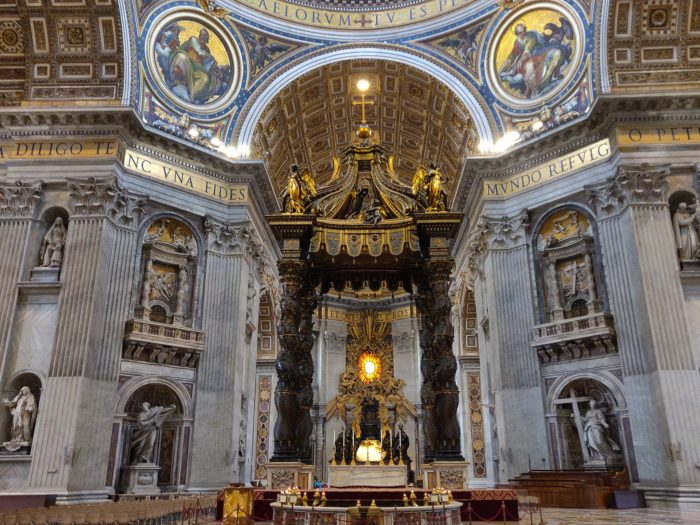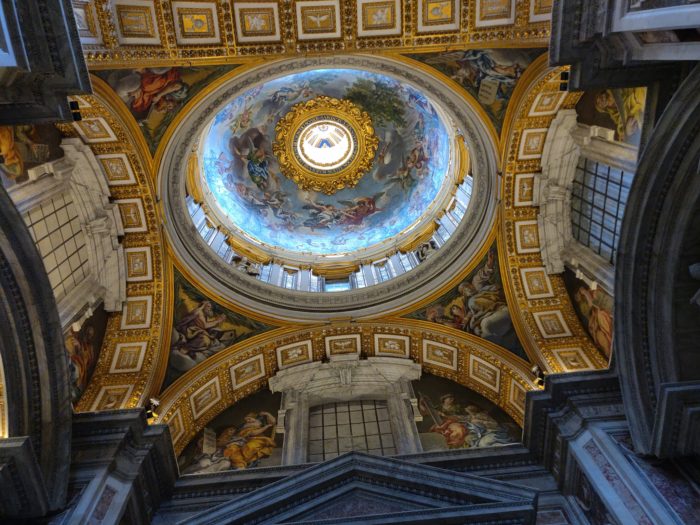The Power of Christ Compels Us
I recently returned from a week-long trip to Rome, Italy. It was an incredible experience and I saw places that I’d been dreaming of since I was just a boy (after my “Native Americans” and “dinosaurs” phases, I went through an “Ancient Rome and Egypt” phase). Walking in the Roman forum and standing beneath the arches of the Colosseum and craning my neck to view the ceiling of the Pantheon felt surreal but also gave me a deeper sense of reality of these historic places. These weren’t just vivid images in travel books or documentaries; I was there, looking at these stone marvels with my own eyes. My wife, children, and mother also joined me so it was especially wonderful to share these memories as a family.
Of all the wondrous places we visited, the highlight was the Vatican, and St. Peter’s Basilica in particular. The Vatican was incredibly crowded and it was impossible to fully appreciate the majesty of its miles of galleries and the glorious Sistine Chapel. But even a few minutes with those masterpieces stamped an indelible impression on my giddy imagination. And then we entered St. Peter’s. I’ve been a big fan of medieval and Renaissance architecture, especially churches and cathedrals, for a long time and I’ve seen a few spectacular buildings in my travels, but St. Peter’s left me speechless. Its dimensions were mind-boggling, and the incredible paintings on the ceiling and dome weren’t paintings, but mosaics composed of tiny colored tiles. Our tour guide informed us that the sanctuary ceiling bore more than six thousand pounds of gold, carved into delicate and intricate designs. If I had to sum up St. Peter’s Basilica in one word, it would be “sublime.” It truly felt like heaven on Earth, which was its creators’ intention.
Yet despite the opulence and majesty surrounding me, I also felt disquiet in my heart. It was very obvious that this church was an idol, and while it was claimed to have been built for the glory of God, it inspired feelings of awe for man instead, and for the Holy Roman Church. Imagine how a poor peasant from the countryside would feel stepping into the rapturous sanctuary. It would be simply overwhelming, and their spinning head would be subject to the whims of the church, which valued money over prayers and sound doctrine. St. Peter’s Basilica is a grand propaganda tool, a display of the might of the church and a testament to the power of the Pope, supposedly God’s voice on Earth.
The Bible admonishes Christians on multiple occasions that the Spirit-filled walk will be marked with persecution and trials. Never are we exhorted to seek out political or military power or to set up “Christian” empires. That’s not to say that worldly power is bad, and when Christians find themselves with that power, they are expected to use it for God’s glory and the good of the church. Yet it is a constant temptation to seek power, because let’s face it: no one likes persecution.
 In nations with a strong Catholic tradition, the power of the church is more overt. In the USA, with our Protestant roots, we bristle at the thought of a massively powerful corporate religious entity, but we seek the same power in different ways. We try to keep our government as “Christian” as possible through our votes. We brainstorm ways to infiltrate secular strongholds like entertainment and media. We try to cultivate Christian “soft power” to counter the poisonous culture in which we live. All of these are noble pursuits but we need to first ask if we are doing so to increase our witness or simply to make our earthly lives more comfortable and/or profitable. The rallying cry of “We need more Christians in ______” isn’t automatically God’s will. It may very well be, but we need to remember whose glory is the most important. If you’ve ever walked into a grand cathedral, ask yourself: was your first thought “Wow, God is so wonderful!” or was it “Wow, these architects and craftsman were incredible!” The cathedrals we build today, whether real or virtual, should be subject to the same scrutiny.
In nations with a strong Catholic tradition, the power of the church is more overt. In the USA, with our Protestant roots, we bristle at the thought of a massively powerful corporate religious entity, but we seek the same power in different ways. We try to keep our government as “Christian” as possible through our votes. We brainstorm ways to infiltrate secular strongholds like entertainment and media. We try to cultivate Christian “soft power” to counter the poisonous culture in which we live. All of these are noble pursuits but we need to first ask if we are doing so to increase our witness or simply to make our earthly lives more comfortable and/or profitable. The rallying cry of “We need more Christians in ______” isn’t automatically God’s will. It may very well be, but we need to remember whose glory is the most important. If you’ve ever walked into a grand cathedral, ask yourself: was your first thought “Wow, God is so wonderful!” or was it “Wow, these architects and craftsman were incredible!” The cathedrals we build today, whether real or virtual, should be subject to the same scrutiny.






























Great article, Mark.
Yeah, I visited Rome in 2012. I was really amazed by many aspects of the city, and while I have been to many cathedrals that inspired a sense of God’s greatness, St. Peter’s struck me as a building intended to impress upon those who visited the greatness of the CHURCH and not God. I actually disliked most of the building, though there are individual works of art within St. Peter’s I thought were great.
And there is a lesson of course as you said–Christian art should not primarily be about praise of the artist…
Although I haven’t seen the Vatican, I have been in gorgeous church buildings both in Europe and the United States. The National Cathedral in Washington D.C. is pretty incredible. I understand your disquiet, your thoughts here. Although these buildings were built to lift our eyes to God, to put us in awe of his majesty, we are often instead caught staring at the gold-plating and the intricate designs. Are these buildings a celebration of Christ or a celebration of man?
As a writer who knows artists (I can’t draw stick figures or paint or sculpt), I know Christians who create art for God’s glory would rather have His majesty proclaimed than their own. I think the creation of beautiful churches can be a way of worship for craftsmen and artisans. However, they can be part of an empire that distracts us from who Christ really is – the Son of God and the Son of Man, born in a stable, a carpenter, a preacher who spoke to thousands on hillsides and from fishing boats, a man who understood the parable of the yeast and the parable of the the prodigal son.
Jesus showed us God’s love in every action and word. To follow him, to honor him, to worship him – we know we need to love like him.